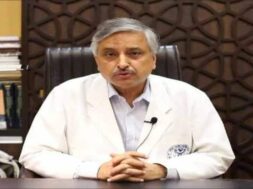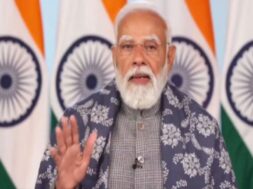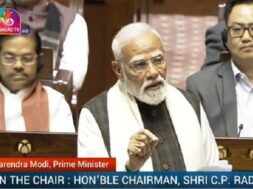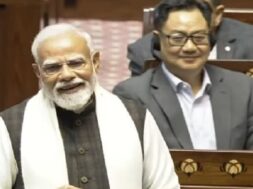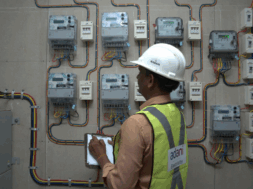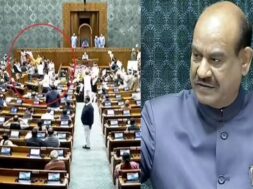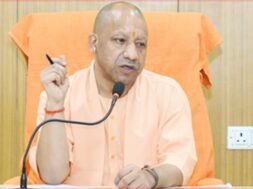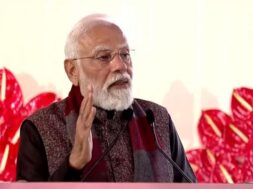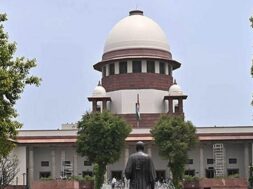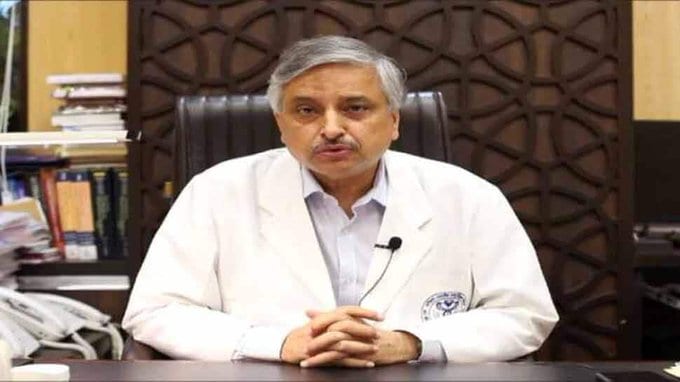
Manas Dasgupta
NEW DELHI, June 19: Amidst reports that the easing of Covid-related lockdown norms has led to crowding in some markets and other places and the Centre urging the states to take stricter measures to avoid over-crowding, the All India Institute of Medical Sciences director Randeep Guleria on Saturday warned of an “inevitable third wave” within six to eight weeks if people continued to flout Covid-appropriate behaviour.
Expressing serious concern over people’s careless behaviour that has unnerved many of the state governments also, the union home secretary Ajay Bhalla asked the states urged the states to ensure the “extremely important” five-fold strategy of Covid-appropriate behaviour, test-track-treat, and vaccination was in place to prevent the spread of the disease.
In a letter to all states and Union Territories (UTs) on Saturday, Bhalla said vaccination against Coronavirus was most critical to break the chain of transmission.
Though many epidemiologists have already indicated that a third wave was inevitable, they had said it was likely to hit the country in September-October.
But Guleria differed predicting ever a more dangerous third wave if the present careless tendencies continued. “If Covid-appropriate behaviour is not followed, the third wave can happen in six to eight weeks. We need to work aggressively to prevent another large wave till vaccination kicks in,” Guleria said.
“A national-level lockdown cannot be a solution (to rein in the pandemic) keeping economic activity in mind,” he further said, adding that there was a need for stricter surveillance and area-specific lockdowns in case of a significant surge.
Dr Guleria said the country’s main challenge was vaccinating a huge population and the increase in dose gaps for Covishield “may not be a bad” approach to provide protection to cover more people, he explained.
A new frontier would have to be developed in India’s fight against Covid to further study the mutation of the virus, he said referring to the new Delta-plus variant, which had evolved from the Delta variant of COVID-19, triggering fresh concerns about monoclonal antibody treatment.
“As we have started unlocking, there is again a lack of Covid-appropriate behaviour. We don’t seem to have learnt from what happened between the first and the second wave. Again crowds are building up… people are gathering. It will take some time for the number of cases to start rising at the national level. Third wave is inevitable and it could hit the country within the next six to eight weeks… may be a little longer,” Dr Guleria said. “It all depends on how we go ahead in terms of Covid-appropriate behaviour and preventing crowds,” he added.
So far, only about five per cent of the country’s population had been fully vaccinated. The government aimed to vaccinate 108 crore of over 130 crore people in the country by the end of this year.
“That (vaccination) is the main challenge. A new wave can usually take up to three months but it can also take much lesser time, depending on various factors. Apart from Covid-appropriate behaviour, we need to ensure strict surveillance. Last time, we saw a new variant – which came from outside and developed here – and led to the huge surge in the number of cases. We know the virus will continue to mutate. Aggressive surveillance in hotspots is required,” the AIIMS chief said.
“Mini-lockdown in any part of the country, which witnesses a surge and a rise in positivity rate beyond 5 per cent, will be required. Unless we’re vaccinated, we’re vulnerable in the coming months,” he underlined, stressing that “testing, tracking, and treating” should be the focus in hotspots.
“We have to factor in human behaviour while unlocking, which needs to be done in a graded manner,” Dr Guleria stressed.
On the spread of the Delta variant in the United Kingdom, which is now facing a third wave, he said, “Virus is still mutating, we need to be careful”.
The highly transmissible variant first identified in India is now making up 99 per cent of fresh COVID-19 cases in the UK, media reports said. The gap between the new waves is shortening and it’s “worrying,” Dr Guleria said.
“During the first wave (in India), the virus was not spreading that rapidly… all that changed during the second wave, and the virus became much more infectious. Now the Delta variant that’s spreading is much more infectious. Faster spread is likely,” said the AIIMS chief.
A debilitating second wave had led to the shortage of hospital beds and medical supplies in various parts of India. SOS messages on social media had caught the world’s attention with many nations coming forward to help. Several states have now eased the restrictions after weeks of strict curbs.
In Maharashtra, the experts have warned that the third wave of the virus could cause eight lakh active cases in the state, which currently has around 1.4 lakh patients.
“When there is a huge increase in the number of cases, shortage of (hospital) beds follows. The strategy should be multi-pronged – we have to make sure fresh cases don’t rise. Any healthcare system globally will tend to collapse with the unprecedented rise in the infections,” Dr Guleria said.
Does India need to rethink its 12-16 week gap decision between two doses of Covishield, a vaccine the country is largely dependent on? “Nothing is written in stone. We will have to look at new strategies. But we need to have strong data to take that decision. The decision should be driven by science and not the shortage of doses,” the AIIMS chief said.
The United Kingdom adopted the one-shot strategy not only for AstraZeneca (which is being used as Covishield in India), but also for Pfizer, Dr Guleria pointed out. “One-shot strategy may not be a bad strategy as it can give protection to larger number of people,” he said.
On the Delta-plus variant, the AIIMS chief explained: “We need an aggressive genome sequencing to see how the virus is behaving. Does the vaccine efficacy come down, does the monoclonal antibody treatment work? To do all of that, we need to have a large or very good network of labs to study the data. I think that’s where to move in the next few weeks. And that’s the new frontier we need to develop if we want to succeed in our fight against Covid,” he said.
Dr Guleria’s statement came a day after the Delhi High Court expressed concern over violations of the Covid-appropriate norms in markets in the national capital following the easing of restrictions this week and had warned that the breach of protocol would only hasten the third wave.
Taking note of certain photographs sent to one of the judges of the High Court by an AIIMS doctor showing scant regard for Covid protocols by street vendors in markets, a vacation bench of Justices Navin Chawla and Asha Menon directed the Centre and the Delhi government to submit status reports about the situation. The third wave cannot be permitted at all, Delhi HC stated.
“We have paid a huge price in the second wave. We don’t know if there is any household which has not suffered in the second wave, closely or remotely,” the bench had observed.
The court had also asked authorities to take strict measures against violators, sensitise shopkeepers and hold meetings with markets and vendors associations in this regard.
Large-scale violation of Covid norms in public places have been reported from many parts of the country ever since restrictions were relaxed.
The Maharashtra Deputy Chief Minister Ajit Pawar said the decision to reimpose restrictions was taken because various tourist spots and market places had been witnessing huge crowds. After granting some major relaxations in Covid restrictions earlier this week, the Pune municipal corporation was compelled to roll back some of them announcing that weekend lockdowns would stay for now and all non-essential shops would remain closed on Saturdays and Sundays.
“We have seen in last few days huge crowds at hill stations, tourist spots and markets. It’s beyond my understanding why citizens are behaving in this manner,” said Pawar.
With 60,753 new Covid cases being reported in a day on Saturday, India’s total tally rose to 2,98,23,546, while the number of active cases stand at 7,60,019, the lowest in 74 days, according to Union health ministry data.
The death toll climbed to 3,85,137 with 1,647 fresh fatalities and active cases comprise 2.55 per cent of the total infections, while the national Covid recovery rate has improved to 96.16 per cent, the data updated at 8 am showed.
Appealing to people not to drop their guard, Guleria also said that the moment a significant surge in cases is noted in a particular area and the positivity rate goes beyond 5 per cent, area-specific lockdown and containment measures should be implemented.
He, however, reiterated that till now, there is no evidence to suggest that children will be affected more in the next wave of the pandemic.
The union home secretary in his letter to all states and Union Territories (UTs) said vaccination in the present scenario, was most critical to break the chain of transmission. Therefore, all state and UT governments should step up the speed of vaccination to cover maximum number of people in an expeditious manner, he said.
Bhalla said during the second Covid wave, a significant surge in cases was witnessed in several states and UTs, and many of them imposed restrictions in order to contain the spread of the infection. “With a decline in the number of active cases, many states and UTs have started relaxing restrictions. I would like to highlight that the decision to impose or ease restrictions has to be taken based on the assessment of the situation at the ground level,” he said.
Bhalla said while the opening up of activities after decline in cases was essential, states and UTs must ensure the whole process was “carefully calibrated”. “While opening up, it would be extremely important to follow the five-fold strategy of Covid appropriate behaviour, test-track-treat and vaccination,” he further added.
Regular monitoring of Covid-19 appropriate behaviour was required to prevent relapse, he said, adding, this includes mandatory use of masks, hand hygiene, social distancing and also proper ventilation of closed spaces. “However, easing of restrictions in some states have led to resumption of crowding of people in markets etc., without adherence to the norms of Covid appropriate behaviour,” Bhalla said. It is therefore essential to ensure that complacency did not set in and there was no let-up in adhering to Covid-appropriate behaviour while opening up activities, Bhalla added.
